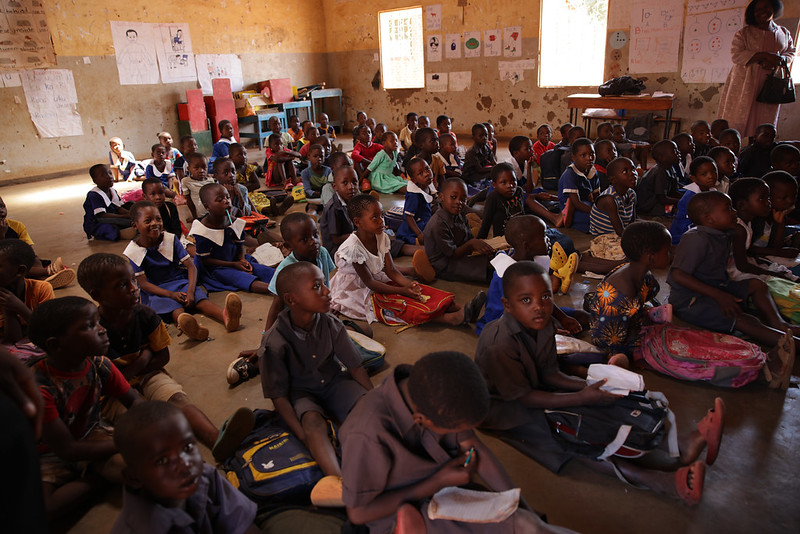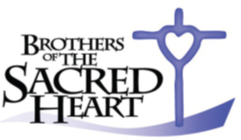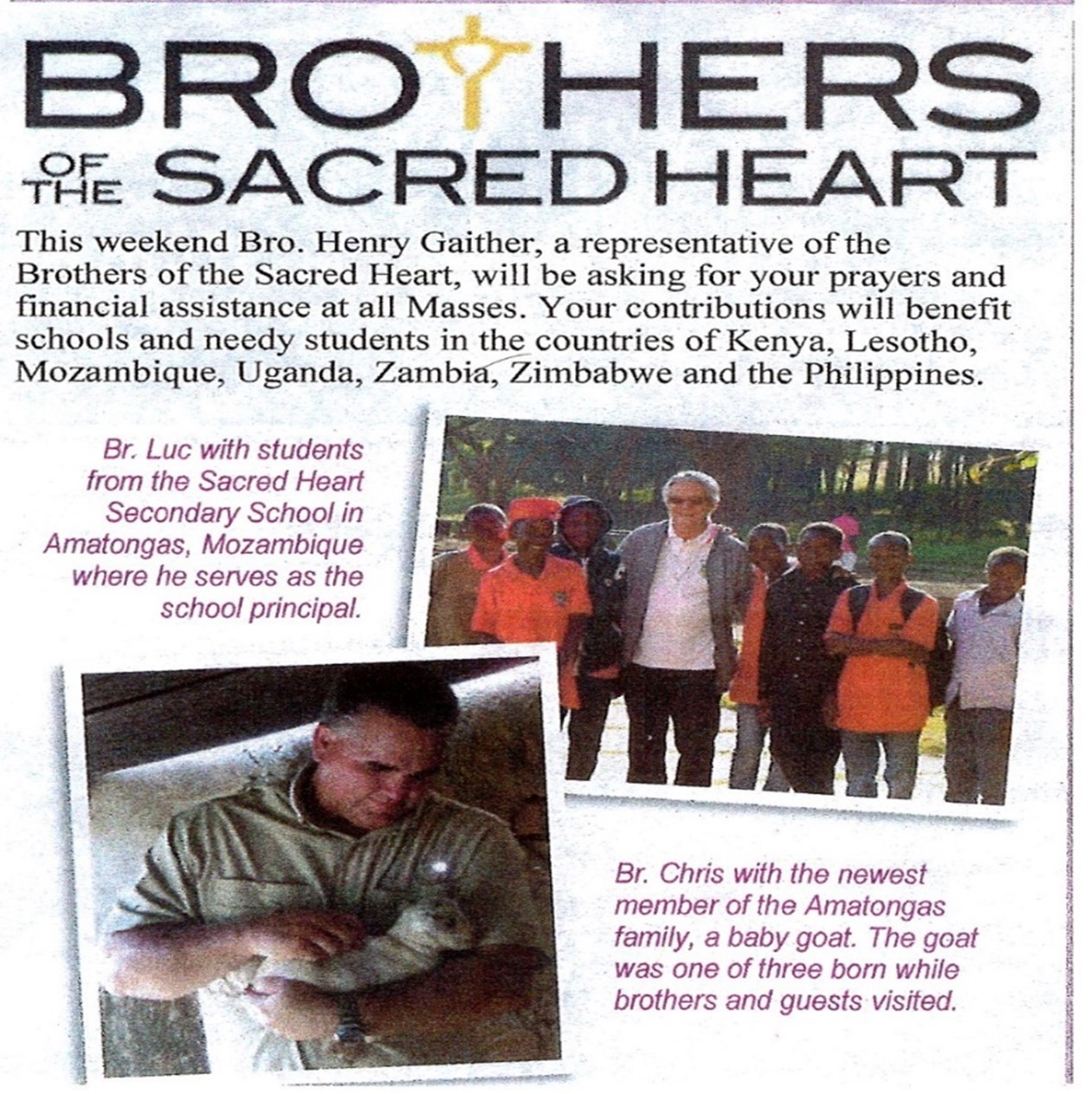Your cart is currently empty!

Brothers of the Sacred Heart #1373
Brothers of the Sacred Heart #1373
Dear Friends,

I would like to tell you about our religious community, the Brothers of the Sacred Heart and our reaching out to several extremely poor areas around the world including parts of Africa, the Philippines, and a Navajo reservation in Arizona. I will begin with a short background of the beginning of our Community.
History of our Community
We were founded in 1821 by Rev. Andre Coindre in Lyon, France. Our first foundation in the United States was in Mobile, AL in 1847. From Mobile, we branched into Canada and to many cities in the United States. Worldwide we are presently conducting schools in 32 countries. In the early days in the United States, we served mostly in orphanages and parish elementary schools with a limited presence in secondary schools. Our US Province now has four high schools in the Northeast and six in the South. We also operate a mission on a Navajo Reservation in Arizona.
Our Work in Africa
We have brothers teaching in six countries in Africa . . . Kenya, Uganda, Lesotho, Zambia, Zimbabwe, and Mozambique. We also have a project for abandoned street children in the Philippines.
Our poorest African school is located in Kabwe, Zambia. The school is called Sitima and is named after a popular brother who was killed in a motorcycle accident. The government of Zambia is also poor, but we are fortunate that the government can pay subsidies to cover the meager salaries of the teachers. The school has about 725 children. The families of the children are extremely poor; 90% of the children are unable to pay at all.
At their homes, the conditions are so different from our experiences that even imagining this would be difficult for us. When they arrive home from school, there are jobs to be done. The boys help their dads with communal farming chores and the girls have as their job to walk to the nearby well to get the water. They carry the water home in canisters on their heads. We are fortunate that our schools all have wells on their properties.
It is through the generosity and kindness of parishioners like yourselves and also the Lenten mission drives from our schools here in the United States that these schools are able to operate.
All of our schools in Africa serve impoverished students. And as I mentioned the Sitima school in Zambia is the poorest. Our schools not only educate but are responsible for feeding and clothing the children as well. Most of the children, especially those in Zambia, cannot afford to pay even a fraction of tuition. Without this school in Zambia or the other schools which are operated by our Brothers, these young people would have no education and most would have no sustenance or significant support in their lives. If the school cannot feed them, these poor children literally don’t eat.
For food, they eat mostly what they can be served at school. Droughts in Zambia in recent years have especially damaged agriculture and affected millions of people due to crop failures, food and water shortages, livestock deaths, and a weakening economy.
The living conditions, especially for the students at this school are very bleak. Many live in huts built of tree limbs and materials such as straw and have no indoor plumbing. Since these huts have no electricity, the children must study by candlelight. For these children, transportation is mostly non-existent. They have to walk two to three miles to and from school and many do so shoeless.
Many graduates of our schools have been able to procure jobs in their communities and larger towns as teachers, law enforcers, and office workers. The present king of Lesotho and a former prime minister are both graduates of Brothers of the Sacred Heart Schools.
The majority of the parish proceeds go directly to the needs of the students with an emphasis on their food and clothing. Other expenses this year included some new desks and the painting of classrooms.
Our Work in the Philippines
Before closing, I would like to mention the program called Project Iconhope connected with our
school in the Philippines. This is a home for street children-literally, between 6 and 18 years of age. At present, we have 18 young men. We are fully responsible for housing, feeding, clothing, and caring for these young people. We run this as a home, not a school, on the island of Cebu in the city of Bogo. Because of our numbers in the community, we cannot do it alone. So, we also have to employ 5 adults, including a married couple to assist us as house parents.
The entire operation depends on donations to keep it operational. When our Philippines Delegation could no longer support it financially, we, as a Province of the United States, assumed financial responsibility for it rather than see it close and the young men put back on the streets. We are doing all we can to keep it going for them. These donations from our mission appeals are literally a lifeline to keep these young people going. By the grace of God, and with your help, they are not only surviving but thriving!

And once again, it is through the generosity of parishioners like you that our schools can continue to operate and that these young people can focus on education, improve themselves, and look to a brighter future. So, it is with a heartfelt thank you and sincere appreciation that we look forward to meeting you during the summer months.
It is on behalf of the Brothers of the Sacred Heart that we offer you our prayers of thanksgiving for your future generosity.
Sincerely in His Heart,
Bro. Henry Gaither, SC, Missions Procurator
P.S. I will now include some photographs of young people with whom we work in Africa and in the Philippines. (Notice the bottlecaps in the photos where they are playing checkers.)
Support the Brothers of the Sacred Heart #1373
You can support the Brothers of the Sacred Heart #1373 through your prayers and monetary donation by making a check payable to THE SOCIETY FOR THE PROPAGATION OF THE FAITH, 3424 Wilshire Blvd 3rd Fl., Los Angeles CA 90010, memo #1373. You may also donate online by clicking the donate button. When making an online donation, reference #1373 in the Memo box. Your donation is tax-deductible as allowed by law.
Mission Cooperative Plan